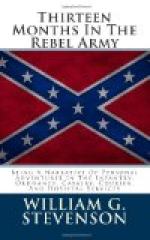Mobile was stagnant commercially, business at a stand-still, many stores closed, and all looked gloomy. The arrival from Havana of a vessel which had eluded the blockading fleet, loaded with coffee, cigars, &c., produced a temporary and feeble excitement. But so frequent were these arrivals that the novelty had worn off: though in this fact I see no ground for reproaching either the heads of department at Washington or the commanders of the blockading squadron at that point. The whole coast is indented with bays, and interior lines of navigable water are numerous; so that nothing but a cordon of ships, in close proximity along the whole coast, could entirely forbid ingress and egress.
Another instance of the rigid surveillance of the press maintained in the Confederate States is suggested by this incident. The city papers of Mobile made no mention of this arrival, though all knew it. Early in the year, Southern papers boasted of the number of ships which accomplished the feat, giving names, places, and cargoes; but months ago this was forbidden, and wisely for their interests. Recently I have seen no mention in Southern papers of the importation of cannon or any thing else, except in purposely blind phrase as to time and place.
I returned to the hospital, feeling that my destinies were wrapped up with it for a while yet. Here I witnessed an illustration of the power of popular enthusiasm worthy of mention. A miserly old gentleman, who had never been known, it was said, to do a generous act, and who had thrown off all appeals for aid to ordinary benevolent causes with an imperative negative, was so overcome by the popular breeze in favor of the soldiers, that he came into the hospital with a roll of bank-bills in his hand, and passing from cot to cot gave each wounded man a five-dollar bill, repeating, with a spasmodic jerk of his head and a forced smile, “Make yourself comfortable; make yourself comfortable, my good fellow.” I am afraid he, poor fellow, did not feel very comfortable, as his money was screwed out of him by the power of public opinion.
The Surgeon-general, a man as noble in private life as distinguished in his profession, asked me to take charge of a hospital at Selma, one hundred and eighty miles up the Alabama river, under the direction of Dr. W.P. Reese, post-surgeon; and on the 21st of April I left for that place, with twenty-three wounded men under my care. We reached the town the next day, my men improved by the river transit. Here we were again met by carriages, in readiness to convey the wounded to a hospital, fitted up in a large Female Seminary building, admirably adapted for the purpose, with spacious rooms, high ceilings, and well ventilated. One wing of this building, containing a large music-room, was appropriated to my charge. The sick men of a regiment organizing there, occupied another part of the building. The school, like so many others in the South, was scattered by the war.




